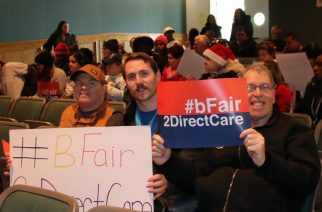
Full court press is on for the passage of laws permitting physician assisted suicide in New York state. Spokespeople in the media proclaim that only the individual should have the choice as to when to die. The slogan in circulation is that people have, “a right to die” as though death for anyone is optional. Dramatic presentations in film and book almost always frame the decision for deliberate, premature death as noble and the kindest choice for everyone.
Not so fast.
When the public is offered death as a solution to problems, I’ve learned to take a closer look at just what is being presented, to project the short and long-term implications of a death solution, and to consider alternative motivations of people proposing such solutions.
We have experience with physician assisted suicide in states that have made it legal, as well as in other nations. The Netherlands was the first nation to legitimize the questionable practice, justifying the need for it based upon untreatable pain, imminent death and of course, patient choice. Now, just 50 years later, a patient’s hopelessness is good enough to end a life. Doctors are immune from prosecution when euthanizing children under the age of twelve, for so long as the Groningen protocols are followed.
My memory reviews the 40-plus years of our nation’s experience with another death solution, abortion. Sold to the public as the compassionate response to a mother in a terrible situation, it was to be rare, and would avoid bad complications for women, children and families. The decision is allegedly autonomous; the pregnant woman in sole control of her decision. But now we see that in New York state for example, almost half the abortions completed in any recent years are the second, third or fourth abortion, a woman endures. Almost half of the abortions are paid for with New York state Medicaid tax dollars, involving us all. Recognition that sex involves procreation as well as pleasure seems discarded along with the fetal tissue. This has not boded well for born American children, too many living in dysfunctional situations that bear no resemblance to stable families, with mothers used and abused.
Death is almost always a quick and tidy way of eliminating a problem when the scope of the problem is defined very narrowly and only immediate consequences are considered. Weapons of mass destruction and the death penalty come to mind as other grievous offenses to our shared humanity.
Regardless of the soft, romantic presentations of chosen premature death, there is a reality that extends beyond the individual patients “choice.” Will little booklets instructing survivors how to explain to the distraught that the absent love one was just exercising his or her autonomy be disseminated? The experience in the northwest of the United States indicates that death is not chosen because of intractable pain but because of more mundane reasons like equating human value with toileting habits. A dangerous thought to be institutionalized in the law of land. As the poet John Donne penned, “No man is an island …”
We must really consider the consequences of embracing intentional death in the face of human suffering. Several studies of the cost of medicine have indicated that the last year of life is the most expensive year of health care for most people. I always like to ask how we know it is the last year, until it is. Who will decide whose life cannot benefit from continued treatment? Patients are dependent upon physicians’ advice based on training, experience and perspective. What if your doctor is cautioned that his expenses are too high? What if your medical system doesn’t want to fund a therapy that will keep you alive long enough to dance at your daughter’s wedding but that is expensive. What if your doctor’s perspective is that the only life worth preserving is the life that requires no assistance with eating, drinking or waste disposal? And what if you are the doctor or pharmacist who conscientiously rejects putting people down? Will the government attempt to force those medical professionals to attend to the task anyway, as objecting bakers and florists and photographers are forced to participate in same sex marriages?
Suicide, which takes more American lives each year than car accidents, is seemingly easy enough to plan without putting it in law. The despair that the sick often encounter is better treated with kindness than death. And death should not be enshrined in our governments’ laws as just another choice.
Armantrout is a current and founding director of the Finger Lakes Guild of the Catholic Medical Association, past member of the Empire State Stem Cell Board, past member of the Rochester Democrat and Chronicle Board of Contributors, retired for the RC Diocese of Rochester and NYS OMRDD.









